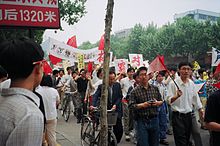
There is a history of anti-Americanism in China, beginning with the general disdain for foreigners in the early 19th century that culminated in the Boxer Rebellion of 1900, which the United States Marine Corps participated with other powers in suppressing. The 1905 Chinese boycott of American goods to protest discrimination against the Chinese living in America had a major negative impact on Chinese attitudes. After the Chinese Civil War, the United States and China fought an undeclared war during the Korean War, in which 148,000 Chinese soldiers died, that left bitter feelings on both sides. Relations warmed up after 1970, but large-scale anti-American sentiments significantly increased since US President Donald Trump launched a trade war against China in the late 2010s.
